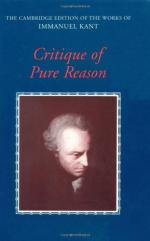|
This section contains 387 words (approx. 2 pages at 300 words per page) |
World of Physics on Immanuel Kant
Considered one of the most important European philosophers of modern times, Immanuel Kant was not only a significant figure in the history of metaphysics, but also applied his keen intellect to fundamental issues in mathematics and physics. Born in Konigsberg, East Prussia (now Russia), Kant thrived in school at a young age and enrolled at the University of Konigsberg in 1740 as a theological student. Additionally, he was drawn to a wide range of central fields in philosophy and to the sciences, including mathematics, physics, and physical geography. After graduation Kant tutored in private homes for several years. Later, Kant became a lecturer at Konigsberg, where he also received a master's degree in 1775.
During his lifetime, Kant received wide renown for his teachings and writings. One of Kant's first and most important scientific publications was a view of the universe called General History of Nature and Theory of the Heavens (1755). In it Kant hypothesized that the universe formed as the result of a spinning nebula, an idea that was later developed by French physicist and mathematician Pierre-Simon de Laplace (1749-1827) and, eventually, disproved. However, Kant was on the mark with his proposal of the existence of many "island universes," such as our own Milky Way, which he described as a lens-shaped collection of stars. In the Metaphysical Foundations of Natural Science (1787), Kant stated that the study of nature must be grounded in mathematics. Although Kant is remembered for his efforts in metaphysical philosophy, he also contributed greatly to the philosophy of science. In his celebrated philosophical tome, Critique of Pure Reason (1781), which took 10 years to complete, Kant outlined his "Antinomies of Reason," or limits to understanding through scientific thought, which included Kant's arguments concerning philosophical issues such as the existence of God, free will, and immortality.
A small, stooped man who suffered from ill health throughout his life, Kant never traveled and spent his entire life in East Prussia. Nevertheless, his writings profoundly challenged many of the prevailing philosophical and scientific principles of his time. Kant's insights were applied to the physical sciences and to philosophical and religious movements such as transcendentalism. Kant died at the age of 79 and was buried in Konigsberg. His tombstone is inscribed "The starry heavens above me and the moral law within me," representing the two major focuses of his life.
|
This section contains 387 words (approx. 2 pages at 300 words per page) |


